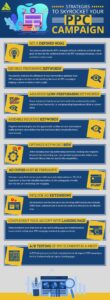Unarguably, the most successful form of online marketing is PPC ads. As the name suggests, it works on a pay-per-click basis – that is, the advertiser pays a fee to Google when advertisements are clicked on by a user. Google deliberately makes getting started on AdWords incredibly easy. In certain cases, it’s as easy as picking a handful keywords, drafting an ad, and adding credit card information, of course.
To give you a good idea, Google earns almost 80% of US search ad revenue. With this number and the simplicity factor, one of the best steps you can make in your marketing strategy is to set up a good AdWords plan. There are virtually unlimited ways to continue gaining more exposure and boosting revenue out there.
So, here I’ll show you all the tips and tricks to optimize your PPC campaigns.

You cannot optimize the PPC strategies without a definite and achievable goal. The cornerstone of your optimization process is your campaign objectives. That’s why you have to make sure you have a plan to pursue before you start advertising for PPC.
You’ll then be able to compare your campaigns after determining your goals and see whether you’ve reached the desired level or not.
You need to evaluate the efficiency of your keywords to optimize your PPC campaigns. As they are the building blocks of all PPC campaigns keeping a check on them is very crucial.
You will also see which keywords are the best performers by reviewing the performance report of your keyword and are actually paying you back.
Another thing to bear in mind here is that just because certain keywords do the well is not to let them run as they are. Continue to make modifications to these keywords’ bidding strategy. You will track the best bid for each of the keywords by doing so.
Pause keywords that do not perform well after analyzing the performance of your keywords, i.e. not generating impressions, clicks or conversions.
Such keywords play a key role in wasting the spending of your ad. If a keyword cannot generate impressions, it means users are not searching for it.
Negative keywords are vital keywords that save the ad budget by deterring irrelevant search queries from triggering your ads. They encourage you to make sure your ads just come before those who are actually looking for your offer.
Negative keywords give you the opportunity to filter out any unnecessary traffic and save some dollars that the irrelevant clicks would otherwise have wasted.
The next step is to adjust your keyword bids so that you stay in the competition after choosing your top-performing keywords, creating your negative keyword list and culling your non-performing keywords.
An ad copy is your first contact point with your potential customers. The first impression is the most valuable impression, as the saying goes, so make sure the ads are convincing and engaging.
To attract more and more potential customers, create distinctive ad copies. This includes the creation of headlines that capture attention. Many web users just scan the page and focus on the headline, so make sure the product/service is presented in an enticing manner. A successful CTA measures the PPC campaigns’ efficacy and also improves the CTR.
Ad extensions are the formats of ads showing additional product details. You help your customers get to know you and your products in an efficient and effective way when you show additional information about your products.
Ad extensions also boost your visibility, increasing your CTR and improving your overall ROI.
Make absolutely sure that your ad copy and landing page are complementary to each other. Only if the ad copy is matched with its relevant landing page, your PPC campaign would work at its optimum level. So, it’s important to write the ads while keeping in mind what’s on the landing page.
A/B Testing is a process that is omnipresent at all stages of PPC campaigns, be it in the keywords, ad copy or landing page.
A / B Testing is a critical part of PPC campaigns as it is more relevant to your ads. Since the PPC space is constantly changing and evolving, you should regularly use A / B testing to test your bids, keywords and ad groups to determine which keywords perform best and which bit of ad copy boosts your conversions.
Never forget to track and record the data and results from your PPC. PPC requires constant analysis to deliver the best possible result, and the advantage of this digital marketing approach is that if you take the time to look, you can see every aspect of where your spending is heading.